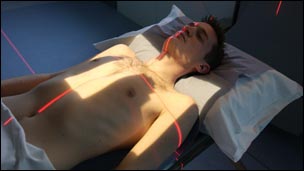Mesothelioma patients can suffer from severe pain, especially as they near the end of life. Doctors and medical researchers are often exploring new methods of treatment to ease the pain for victims. One of the standard pain relievers for mesothelioma patients has been radiotherapy. According to new reports, evidence suggest that radiotherapy is ineffective in treating pain. Though it has been used for decades to treat mesothelioma patients, Scottish scientists are countering that belief with findings that the science in favor of radiotherapy is weak.
According to researchers, there is no quality evidence to support radiotherapy in treating mesothelioma pain. This could be a significant setback to medical practitioners as well as patients and their loved ones who have been relying on radiotherapy treatment. Our mesothelioma attorneys in Boston are dedicated to helping victims recover compensation after asbestos exposure. In addition to helping victims and their families, we are also abreast of trends in mesothelioma medical research and treatment.
The University of Edinburgh has published a report that suggests radiotherapy should be more thoroughly reviewed as a treatment for mesothelioma pain. The researchers found that as the tumors spread across the membrane of the lungs, they can compress the lungs resulting in severe chest pain and shortness of breath. For years, radiotherapy has been a go-to treatment for doctors looking to alleviate this severe pain by reducing the size of mesothelioma tumors. The treatment method was based on prior evidence that radiotherapy does have the effect of slowing tumor growth even though it cannot cure mesothelioma.
New evidence presented by the Scottish research indicates that any scientific evidence supporting pain relief is lacking. The team searched for any radiotherapy studies to track pain symptoms and relief. The researchers were primarily looking for studies that focused on pain relief and that published specific doses, pain responses, and other data. After reviewing the 8 studies that were found, the researchers concluded that they studies did not paint a clear picture of the benefits of radiotherapy to treat mesothelioma related pain. Based on insufficient evidence and findings, the scientists reported that there was no scientific proof that radiotherapy is effective in pain relief or end-of-life care pain management.
The researchers agree that reducing the size of tumors through radiotherapy can reduce pain for some patients; however, the evidence is insufficient to apply to other patients when determining dosages and long-term treatment plans. The Scottish research team has called on the community of medical researchers to organize collective data and to contribute to findings regarding radiotherapy treatment techniques, including dosage and escalation of dosages.
Victims of mesothelioma will usually face a grave prognosis and their families will depend on pain alleviation and end-of-life care. When a treatment method fails, medical practitioners must explore all options to ensure that best possible outcome for patients. In addition to seeking the medical treatment, victims and their families should consult with an experienced legal advocate who can review the circumstances of asbestos exposure and identify responsible individuals or entities.
Call our Boston mesothelioma attorneys for a free and confidential consultation at (617) 777-7777.
More Blog Entries:
Sequester Hits Mesothelioma Research, Dec. 10, 2013, Boston Mesothelioma Lawyer Blog
Lawsuit Against Tobacco Companies Based on Asbestos Filters Result in Tobacco Companies Paying, Mesothelioma Lawyers Blog, November 4, 2013.
 Mesothelioma Lawyers Blog
Mesothelioma Lawyers Blog


